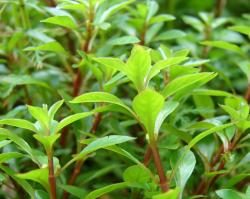Purslane: A Weed Worth Eating
August 6, 2010 | 1 min to read

Purslane sprouts from sidewalk cracks, invades gardens and earns contempt from the U.S. Department of Agriculture, which classifies it as a "noxious weed."
It also happens to be a "superfood" high in heart-healthy Omega-3 fatty acids and beta carotene, one tasty enough to spread, like the weed it is, to farmers' markets and fancy restaurants.
"We have all this sitting in our front yard, and we can eat it, and it's cheaper than salmon," said Joan Norman, owner of One Straw Farm in White Hall.
This terrestrial source of Omega-3 fatty acids has added appeal at a time when buying fish has become so complicated that consumers have to consult their smart phones for the latest health and environmental bulletins.
Known formally as portulaca oleracea, and informally as little hogweed, purslane is a succulent herb that looks, as one Baltimore chef put it, like a miniature jade plant. A more colorful description can be found in seed catalogs, which note that in Malawi, the name for the fleshy, round-leafed plant translates to "the buttocks of the wife of a chief."
To read the rest of the story, please go to: The Baltimore Sun.
